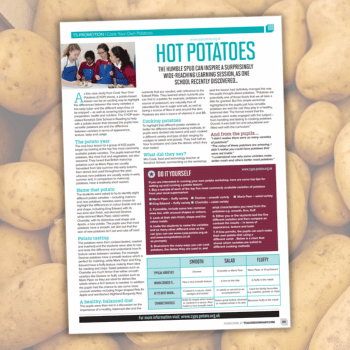Believe it or not, the topic of the humble spud can easily fill a one-hour lesson. Don’t believe us? Take a look at this potato-themed food tech KS3 lesson plan…
A potato-based food tech KS3 lesson can be an exciting way to highlight the differences between the many varieties of this tasty tuber and the different ways we can enjoy them. You can also cover topics such as preparation, health and nutrition.
Starter activity
Begin by looking at the top five most commonly available potato varieties. Explain that potatoes, like most fruit and vegetables, are also seasonal.
We usually harvest British maincrop potatoes such as Maris Piper from late summer into early autumn, then store and use them throughout the year. New potatoes are usually ready in early summer and, in comparison to maincrop potatoes, have a relatively short season.
Ask students to try to identify eight different potato varieties – including maincrop and new potatoes. Choose varieties that highlight the differences in colour (inside and out) and shape, including:
- King Edward (two-tone skin finish)
- red-skinned Desiree
- white-skinned Maris Piper
- salad variety Charlotte (distinctive oval shape)
- apollo (new potato)
Students will see that most potatoes have a smooth, set skin but that the skin of new potatoes isn’t set and rubs off easily.
Cook Your Own Potatoes is a toolkit of multimedia resources to support theory and practical lessons. Explore potato varieties and the importance of understanding that different potatoes are suited to different cooking methods and dishes. Find out about the health and nutrition benefits of potatoes across a variety of diets and discover information relating to sustainability and potato farming.










